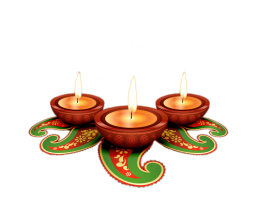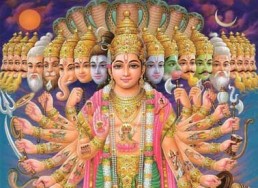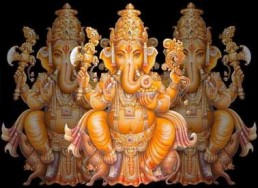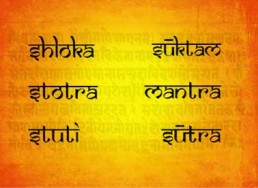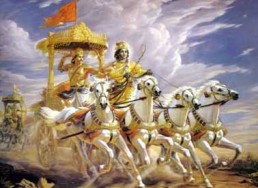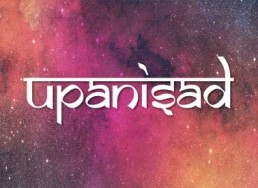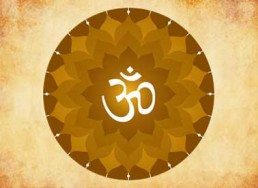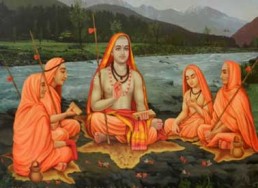Explore Hindu Shlokas
Shlokam.org is one more tiny window that is open to the brilliance of Hindu devotional and scriptural texts. This site is a growing repository of Hindu Shlokas, Stotras, Mantras, Sutras, Stuthis and larger texts including the Bhagavad Gita, the Upanishads and Prakrana Granthas by Sri Adi Shankaracharya and others. All content is in Sanskrit, with English transliteration, English meaning and in most cases supplemented with commentaries (bhashya) along with Audio renderings.
Book Release


After months of dedicated work, we are delighted to announce our new publication. A thoughtfully compiled treasury of Shlokas and Mantras, designed to deepen your spiritual practice and understanding.
Browse the collection
Index of Shlokas
An Index of all Shlokams ranging from single verse Shlokas to large texts such as the Bhagavad Gita and more.
Popular Shlokas
A selection of popular Shlokas displayed in Sanskrit with English Transliteration, Meaning and Notes with Commentaries.
Daily Shlokas
A collection of daily Shlokas to fill your day in devotion as you wake up, bathe, eat, study, work, rest and end the day.
Shlokas by Type
A select list of Shlokas, Stotras, Sutrams, Mantras, Stutis, Sutras etc along with an explanation of these terms.
Bhagavad Gita
The Bhagavad Gita, or the Song of the Lord, is a dialogue between Krishna, and his disciple, Arjuna. View all 701 verses here with commentary.
Upanishads
The Upanishads are commonly referred to as Vedānta. The word ‘Upanishad’ comes from the root Sad (to sit), Upa (nearness) and Ni (totality).
Prakarana Granthas
Prakarana Granthas or Prakriyas are philosophical treatises usually written in simple Sanskrit words pointing the seeker directly to the Truth.
Sri Adi Sankaracharya
Adi Sankaracharya was an 8th century Indian philosopher and theologian who consolidated the doctrine of Advaita Vedanta. Browse Sankara\'s works here.
Types of Content
Various types of content found on this site.
Some definitions first.
Shloka
śloka means "song", from the root śru, "hear" and is a poetic form used in Sanskrit. In its usual form it consists of four pādas or quarter-verses, of 8 syllables each, or two half-verses of 16 syllables each. The meter is similar to the Vedic anuṣṭubh meter, but with stricter rules. The śloka is the basis for Indian epic verse and is used in the Bhagavad Gita, the Mahabharata, the Ramayana, the Puranas and Smritis to name a few.
Stotra
Stotra means "ode, eulogy or a hymn of praise". A stotra can be a prayer, a description, or a conversation, but always with a poetic structure. It may be a simple poem expressing praise and personal devotion to a deity, or poems with embedded spiritual and philosophical doctrines. Many stotra hymns praise aspects of the divine, such as Devi, Shiva, or Vishnu. They are made up of individual Shlokas.
Mantra
Mantra is a sacred utterance, a potent syllable, word or group of words in Sanskrit, that create vibration and resonance. At its simplest, the word ॐ (Aum, Om) is a mantra known as the Pranava Mantra. In more sophisticated forms, mantras are melodic phrases with spiritual interpretations such as a human longing for truth, reality, wisdom, immortality, peace, love, knowledge and action. e.g. the Gayatri Mantra.
Sūktam
A Sūktam is a vedic hymn in praise of the deity intended. It praises the deity by mentioning its various attributes and paraphernalia. There are numerous Sūktas. The Purusha Sūktam is seen in all Vedas, it is cited as the essence of all Srutis by Veda Vyasa in the Mahabharata. Other popular Sūktams include Purusha Sūktam, Vishnu Sūktam, Sri Sūktam, Medha Sūktam and Narayana Sūktam
Sūtra
Sūtra means string or thread. Sūtras are a compilation of short aphoristic statements that are concise expressions of a truth or general principle. Brahma Sūtras (or Vedanta Sutra), composed by Badarayana and contains 555 sūtras that summarize the philosophical and spiritual ideas in the Upanishads. Yoga Sūtras compiled by Patanjali, contain 196 sūtras on Yoga including the eight limbs and meditation.
Bhagavad Gita
The Bhagavad Gita, or the Song of the Lord, is a dialogue between Krishna, an incarnation of Vishnu, and his friend and disciple, Arjuna. This dialogue takes place in the Bhishma Parva of the Mahabharata. The Bhagavad Gita is composed of 701 Shlokas (verses) arranged in 18 chapters. It is one of the best-known philosophical texts of Hinduism, and is said to contain the essence of Upanishadic thought.
Upanishads
The Upanishads, commonly referred to as Vedānta. The concepts of Brahman (the ultimate reality) and Ātman (soul, self) are central ideas in all of the Upanishads, and "know that you are the Ātman" is their thematic focus. One hundred and eight Upanishads are enumerated in the Muktikopanishad of which ten are considered the most important Upanishads from the point of view of Vedantic philosophy.
Prakarana Granthas
Sri Adi Shankaracharya and others have composed many sub-texts or topical texts in simple Sanskrit, called Prakarana Granthas, with the objective of broadening the reach of the message of the Vedas and Upanishads. They explain the creed, the processes, the views and ideas of the Vedanta philosophy, using examples, analogies, illustrations; Sri Adi Shankaracharya composed several Prakarana Granthas.
A tiny fraction
3,284
Shlokas
Featuring a wide variety of content from devotional to philosophical.
All Shlokas in Sanskrit with English transliteration and meaning, along with audio rendering, plus commentaries and notes where available.
3,284
Shlokas
A tiny fraction
Featuring a wide variety of content from devotional to philosophical.
All Shlokas in Sanskrit with English transliteration and meaning, along with audio rendering, plus commentaries and notes where available.

